Publications

Proposals for the design of public policies on popular tourism
The main subject of tourism policies has not been the local population and, even less so, the most popular sectors. In the context of multiple crises and increasing inequalities, this document presents proposals to promote a public policy on popular tourism. These suggestions are articulated under different formulas linked to social tourism or the facilitation of infrastructures for public use and can take place under public, private, community, or individual initiatives. This policy brief mainly addresses the public administrations responsible for elaborating on these policies.
Type: | Responsible Tourism | Ernest Cañada, Carla Izcara, Bastien Montovert & Mariciana Zorzi | Date: 14-11-2024 | Read More »

Recommendations for the Design of Tourism Policies in Latin America and the Caribbean
Despite the importance that tourism has come to acquire on the public agendas of Latin American and Caribbean countries, the outcomes have not led to improvements in the standard of living of their populations. For decades, there has been a widespread bid to boost inbound tourism and to promote the sector abroad as the main cornerstones of public policies in this field. The COVID-19 pandemic in 2020 brought to light the strong external dependence and vulnerability of this development model. Its difficulties in contributing to the achievement of certain professed objectives were also exposed, such as the goals of quality employment, a reduction in poverty, a raised appreciation of local heritage, environmental care and social development. The post-pandemic reactivation of tourism seems to have reinforced this model, accentuating the problems and risks that it involves. In this scenario, an alternative approach to public policymaking is needed, able to contribute to more inclusive, sustainable, solidarity-based models of tourism development.
Type: | Responsible Tourism | Ernest Cañada & Érica Schenkel | Date: 09-11-2023 | Read More »

Recommendations for traveling to the Caribbean
The tourism growth that has taken place after the COVID-19 pandemic in the Caribbean has not necessarily improved the welfare and living conditions of the local population, but rather seems to intensify the negative impacts of the activity. In this context, the document presents proposals to promote more sustainable and responsible tourism aimed primarily at European travel agencies and tour operators. It also targets local administrations to promote tourism that generates a more positive impact on the region.
Type: | Responsible Tourism | Carla Izcara, Giselle Cedeño, Ernest Cañada | Date: 08-11-2023 | Read More »
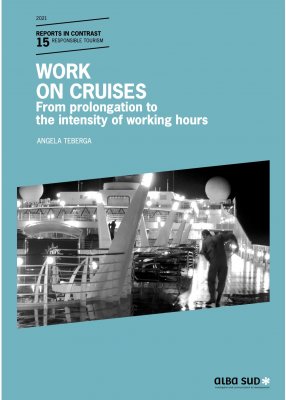
Work on cruises. From prolongation to the intensity of working hours.
In 2019, the cruise industry generated more than 500,000 direct jobs worldwide. However, very little knowledge about the working conditions to which cruise crews are subjected. The purpose of this report is to study the working conditions of cruise ship crews by analyzing their working hours. The choice of this variable is justified because the international literature is unanimous in pointing out that exhausting work shifts (long and intense workdays) are the modus operandi of work on these ships. In this research, it was confirmed that crew members of lower functional hierarchy (crew) work an average of 11.3 hours per day and 6.97 days per week. In addition, more than 80% of the interviewees perceive an increase in work intensity over time. We conclude that, according to the analysis carried out, cruise ships are the ideal laboratory for the exploitation of labor in the tourism sector because, in addition to reproducing the same mechanisms to increase corporate profits, they take advantage of loopholes in international legislation to make the crew's working day more flexible by allowing maximum work limits (14 hours/day or 72 hours/week).
Type: Reports | Responsible Tourism | Angela Teberga | Date: 26-04-2021 | Read More »
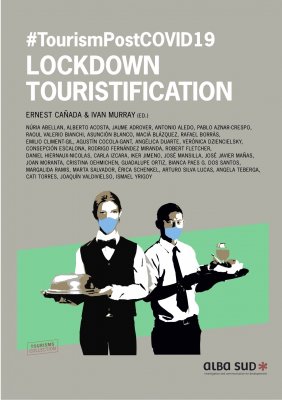
#TourismPostCOVID19. Lockdown touristification
This book, which we are publishing one year after COVID-19 was declared as a pandemic by the WHO on March of 2020, reproduces the efforts of the Alba Sud team, expanded and reinforced by renowned researchers who wanted to join this initiative. It is structured in four parts. In the first one, we analyze what this pandemic year has meant for tourism, with the necessary distance to be able to write from the current moment and put into perspective the events that have taken place throughout the year. In the following three parts, we gather texts that we have been publishing on the Alba Sud website throughout the year, thematically organized in an attempt to understand how we got to the present situation, the description of what was happening with tourism during the course of the pandemic and, lastly, proposals on what to do in this situation.
Type: Books | Responsible Tourism | Ernest Cañada & Ivan Murray | Date: 26-02-2021 | Read More »

Gender inequalities in the tourism labour market
This report aims to connect the concepts of feminisation and precariousness in the tourism labour market in order to analyse the different gender inequalities that emerge in the sector. In total, fifteen gender inequality manifestations that highlight women’s role in the tourism industry and reveal the need for a change have been analysed. This investigation is developed from a critical and intersectional perspective to incorporate aspects such as race, migratory status, social and geographical context, age, level of education, sexual orientation, gender identity, and capabilities; key factors in gender studies. Finally, the report suggests a research agenda to tackle the knowledge gaps detected and proposes future lines of research and concrete case studies. This report has been prepared in the framework of the project «Research Platform on Tourism, Human Rights and Gender Equity», developed by Alba Sud with the support of the Catalan Agency for Development Cooperation (ACCD) (call 2019).
Type: Reports | Responsible Tourism | Núria Abellan, Carla Izcara, Alejandra López, Marta Salvador | Date: 10-02-2021 | Read More »

Volunteer tourism. Characterisation and debates of a global phenomenon.
Volunteer tourism is a global phenomenon that has gained popularity and interest since 1990. Understanding its dynamics and its stakeholders is important to be able to reduce the derived negative effects and to increase the positives. From an anthropological and gender perspectives, this report aims to show a critical view on voluntourism and to characterise the presents debates in the scientific literature. Therefore, North-South relations, colonial dynamics, the role of sending organisations, volunteers’ motivations and behaviours, as well as the impacts on them and local communities are highlighted. Moreover, gender perspective is incorporated as an analytical framework through which to explore dynamics that take place in volunteer tourism. Finally, possible consequences of the COVID-19 crisis on this complex phenomenon are exposed together with future lines of research. This report has been prepared in the framework of the project "Research Platform on Tourism, Human Rights and Gender Equity" developed by Alba Sud with the support of the Catalan Agency for Development Cooperation (ACCD) (call 2019).
Type: Reports | Responsible Tourism | Marta Salvador Almela | Date: 18-11-2020 | Read More »
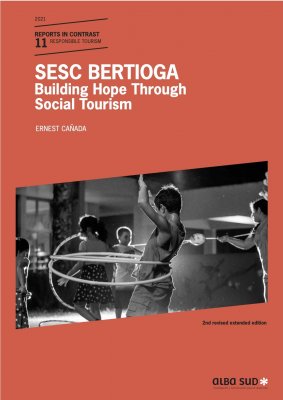
Sesc Bertioga. Building Hope Through Social Tourism.
The Bertioga holiday resort has been in operation since 1948. Located in a coastal town in the state of São Paulo, its target is workers from the trade, tourism, and service sectors. It was one of the first social tourism accommodation centers to be created in Brazil. With a history of over seventy years as a resort and a capacity for one thousand guests and three hundred visitors, SESC Bertioga has become an international reference point in social tourism. In this report, in addition to explaining its origin and the evolution that has made it possible to configure a unique social tourism proposal, three key dimensions are analyzed in detail: who are the users of the tourist complex and what type of services they receive, the working conditions of those who attend them and, finally, their insertion in the host territory. This report has been produced with the support of Barcelona City Council within the framework of a public call for grants for Education for Global Citizenship projects, 2018; and Grant RTI2018-094844-B-C31 funded by MCIN/ AEI /10.13039/501100011033/ and by “ERDF A way of making Europe”.
Type: Reports | Responsible Tourism | Ernest Cañada | Date: 15-11-2020 | Read More »

Tourism in the geopolitics of the Mediterranean
The international financial crisis and the restructuring processes of the global economic system have turned the tourism industry into one of the mainstays of capitalism in its neoliberal stage. The commitment to the intensification of the tourism economy has rekindled social unrest due to massification and tourism pressure, as well as the socio-economic and ecological transformation of coastal territories, with progressive advances over the rest of the rural environment. In addition, in the Mediterranean other axes of tension are resolved that inevitably condition the terms under which tourism can develop: the global war for the control of key energy resources, such as oil or gas, and the dispute over the military and geopolitical control of some of its territories. Given this picture, the current political instability and situation of insecurity in the Eastern and Southern Mediterranean, the emergence of new security logic, and the humanitarian and migratory emergency have updated the debate on the role of tourism in the reconfiguration of the Mediterranean in a global context. All this is also produced against the backdrop of the increasingly noticeable effects of the climate crisis that directly impacts the organisation of tourism, whilst being one of the activities that contributes to the situation. The Mediterranean has become a space in which North-South tensions intersect dramatically in a global world. Tourism appears as a key factor in this scenario, either as an expression of saturation and exclusion, or as an opportunity for development.Therefore, in this report, rather than fixing attention on specific territories, we address some of these debates from an expressly regional perspective. Co-authors: Antonio Aledo, Fernando Almeida, Assumpció Blanco-Romero, Sarah Becklake, Macià Blàzquez-Salom, Ernest Cañada, Samia Chahine, Claudio Milano, Jordi Gascón, Reme Gómez, José Mansilla, Claudio Milano, Enrique Navarro, Daniel Pardo, Llorenç Planagumà, David Ramos, Marta Salvador, Daniela Thiel, Cecilia Vergnano. Prologue by Robert Fletcher.
Type: Reports | Responsible Tourism | Ernest Cañada (ed.) | Date: 30-07-2019 | Read More »
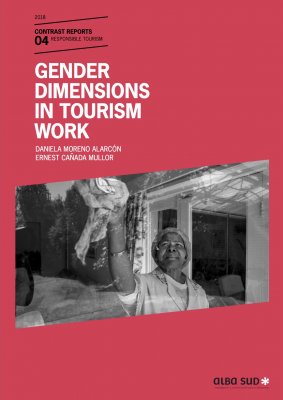
Gender dimensions in tourism work
This report aims to develop a proposal on how to analyse tourism work from a gender perspective. To this end, we intend to clarify, from the existing bibliography and our own research, what seem to us to be a series of fundamental questions: How can women's work in tourism be addressed? What is and what is meant by the feminisation of tourism work? What are the key issues of gender analysis in tourism work? We end with a formulation for a proposal for an integrated gender approach in the analysis of tourism work.
This report has been produced by Alba Sud with the support of the Catalan Agency for Development Cooperation (ACCD) within the framework of the project "Decent work, responsible tourism and empowerment of women" (call for grants 2016).
Type: Reports | Responsible Tourism | Daniela Moreno Alarcón & Ernest Cañada Mullor | Date: 29-05-2018 | Read More »

Rural Community-based Tourism Latin American Catalogue
Experiencie Latin America alongside organized rural communities. Proposals from Argentina, Chile, Uruguay, Bolivia, Peru, Ecuador, Brazil, Panama, Costa Rica, Nicaragua, El Salvador, Honduras, Guatemala, Mexico and Puerto Rico.
Type: Books | Responsible Tourism | Ernest Cañada (coord.) | Date: 09-09-2015 | Read More »
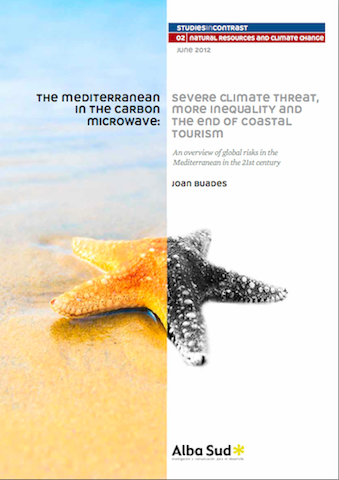
The Meditarranean in the carbon microwave: Severe climate threat, more inequality and the end of coastal tourism. An overview of global risks
Report on the global risks that threaten this region of the planet, which undergoes a high level of climate alert, inequality grows and the model of coastal tourism which have specialized in these areas is in question.
Type: Reports | Natural Resources | Joan Buades | Date: 12-02-2012 | Read More »

Tourism in Central America, social conflict in a new setting
The present report analyses the characteristics of the touristic Central American model, with special attention to the residencialisation processes, and the conditions that favour this development. After that, it exposes how the international economic crisis has affected this sector and what are the current tendencies to strengthen business concentration. Lastly, it reviews the consequences generated by this development model, among which outstands a growing unrest, associated with multiple causes. Those are conflicts derived from the resistance of rural communities to the dispossession of natural resources and territories; because of the resistance of the rural communities to the touristic and real estate abuses and excesses; inter-companies conflicts due to the contraposition of interests on the exploitation of their businesses; conflicts due to the suitability of the tourism policies’ regulatory framework; and, lastly, conflicts derived from the reaction of workers facing precarious labour conditions.
Type: Reports | Responsible Tourism | Ernest Cañada | Date: 26-04-2010 | Read More »

Copenhagen and Beyond. Tourism and global climate justice
Tourism and, in particular, the impact of international air transportation, has been one of the great “oversights” of the Kyoto Protocol (1997-2012) on climate protection. This neglect has been a catalyst for the overall increase in greenhouse gases (GHGs). If it is not explicitly included in the new agreement that ought to be replacing the current one, the unremitting tourism boom threatens in the medium term to wipe out vital advances made in other areas. The United Nations Summit on Climate Change in Copenhagen (7-18 December 2009) must guarantee a real reduction in emissions related to international tourism, one of the world’s prime industrial economies, to keep corporate volunteerism and the recourse to externalizing costs, through a “carbon market” supported by new forms of intensive exploitation of the impoverished global South, from making the absolute balance increasingly negative for the global climate. The principal tools needed from Copenhagen are the setting of concrete, relevant and regulatory GHG reduction targets for the international tourism industry; the right to accurate environmental information on its major contribution to the anthropogenic greenhouse effect; implementation of environmental taxation of aviation and tourism (including cruise ships); and the transfer of resources and a rebalancing of global climate security priorities to favor the South.
Type: Papers | Responsible Tourism | Joan Buades | Date: 30-07-2009 | Read More »

The Balearic tourism empire, where “the sun never sets” Interview with Joan Buades and Macià Blázquez
The seminar “Entre Baleares, Centroamérica y El Caribe: luces y sombras en la construcción de paraísos turísticos” was held in Managua in February 2009, and organized by the Balearic Islands University (UIB) Research Group for Sustainability and Territory (known under the Catalan acronym GIST), the Fundación Prisma and Alba Sud. This initiative was also supported by the Sustainable Tourism Degree Programme of the National Autonomous University of Nicaragua (UNAN-Managua). Attended by university professors, researchers and activists from civil organizations based in Nicaragua, Costa Rica, El Salvador, Guatemala, Mexico and Spain, the encounter explored the characteristics of the Balearic tourism model and its consequences, as well as the threats generated by the main Balearic “sun and sand” hotel chains in their accelerated expansion process into other regions around the world. The seminar was moderated by Joan Buades and Macià Blàzquez, who work as professors and researchers of the GIST. In our interview with them, they discussed some of the main contents of their expositions.
Type: Papers | Responsible Tourism | Ernest Cañada | Date: 07-03-2009 | Read More »
